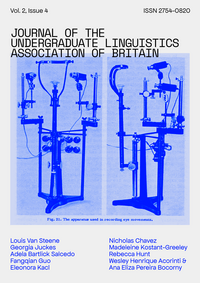Fostering Second Language Acquisition of Canadian Primary School Children: A Critical Evaluation of Vygotsky’s Learning Theory in the French Immersion Programme
Abstract
According to Vygotsky (1978), language originally emerges as a means for children to communicate with others in their surroundings. This perspective of Vygotsky emphasises the significance of the social interaction between children and their environment, which functions as a driving force for children’s language development and learning process. To demonstrate the practices of Vygotsky’s theory in second language acquisition, this paper aims to investigate how Canadian primary school children acquire French oracy through interaction with teachers and peers during immersion programmes. Firstly, the two fundamental aspects of Vygotsky’s learning theory and their theoretical application in the analysis of the pedagogy of the French immersion programme were highlighted. The importance of social interaction and the limited application of Vygotsky’s theory in the construction of children’s linguistic skills were reflected through examples of second language learning in the classroom setting. Then, the paper examined the methodology of Vygotsky and discussed its limitations in terms of current education. Additionally, it analysed the nature-nurture dispute concerning Vygotsky’s underestimation of the innate factor and the development of his learning theory. Lastly, the paper concluded by arguing that Vygotsky’s learning theory had both advantages and disadvantages, which provided a reminder for pedagogic curricula to be more concerned about the interplay between learners, educators, and the learning environment.

Published
Issue
Volume 2 (Issue 2)DOI
Permalink
- This work is licensed under a Creative Commons Attribution 4.0 International License.
